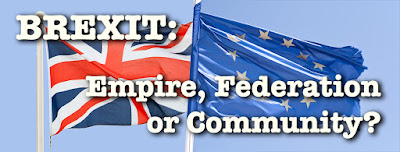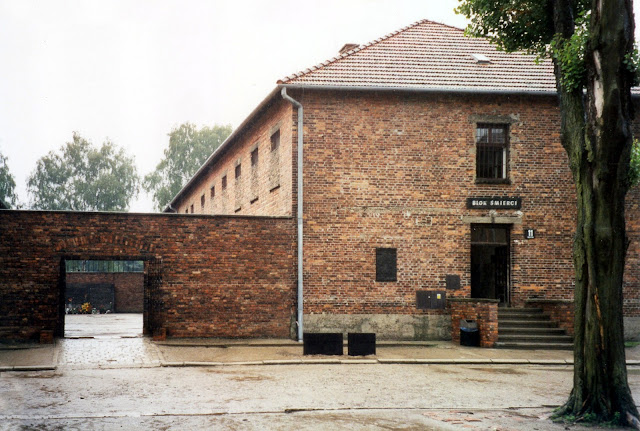Brexit: It's all about Empire, Federation or Community
Some of the criticism of the EU from people against it is that it has a central ruling elite who are disconnected from the everyday population. This makes it sound like an empire but is it actually a valid criticism? And what is the gulf that separates the UK and the European Union?
Throughout the ages we have had empires from the Chinese, Roman, Ottoman, British and a plethora of others. The point about an empire is that its population is 'culturally and ethnically distinct from the imperial (ruling) ethnic group and its culture'. It is contrasted to a federation, which is a 'union of partially self-governing provinces, states, or other regions under a central federal government' or a community which is a 'social unit that has something in common, such as norms, religion, values, or identity'.
To consider the European Union some form of imperial empire one needs to consider it from a phenomenological point of view. I would argue that the approach is disingenuous and that a strategic consideration significantly more efficacious. The EU might look like an empire in the same way that a cannon ball might look like a football. But don't kick the cannon ball!
The two protagonists in the Brexit divorce both have a history and considering their pasts will help us to understand why a phenomenological approach is particularly unhelpful.
The United Kingdom comes to this point with a history of a lost empire. By the beginning of the First World War the British Empire consisted of about one-quarter of the world, both in land mass and population. Conquered by military might it was, however, world trade that was the core to it gaining and maintaining it's dominance.
The First and Second World Wars both demonstrated that in order for the 'allies' to win it required the USA to partner, albeit as the major player, against other European countries. No longer did it have preeminence on the world stage.
The European Union comes with the history of Europe on it's back. This is a history of war, more more and yet more war. In May 1950 the French foreign minister Robert Schuman formally proposed the European Coal and Steel Community as a way to prevent further war between France and Germany. He declared his aim was to 'make war not only unthinkable but materially impossible'. War no more!
Schuman was a Christian Democrat. Christian democracy as a political ideology emerged in nineteenth-century Europe as a mixture of Catholic social teaching alongside Dutch Neo-Calvinism. Both of these two theological streams highlighted bringing Jesus Christ's teaching to bear on the political sphere. In the latter 20th or early 21st Century we might have called them Peace Activists.
There were six signatories to the Treaty of Paris in 1951 which formed the European Coal and Steel Community (ECSC). The aim, however, was not trade, but trade 'an organization putting an end to war and guaranteeing an eternal peace'.
We are carrying out a great experiment, the fulfillment of the same recurrent dream that for ten centuries has revisited the peoples of Europe: creating between them an organization putting an end to war and guaranteeing an eternal peace. The Roman church of the Middle Ages failed finally in its attempts that were inspired by humane and human preoccupations. Another idea, that of a world empire constituted under the auspices of German emperors was less disinterested; it already relied on the unacceptable pretensions of a ‘Führertum’ (domination by dictatorship) whose 'charms' we have all experienced.
Portrait of Robert Schuman,
député from Moselle (1929).
Audacious minds, such as Dante, Erasmus, Abbé de St-Pierre, Rousseau, Kant and Proudhon, had created in the abstract the framework for systems that were both ingenious and generous. The title of one of these systems became the synonym of all that is impractical: Utopia, itself a work of genius, written by Thomas More, the Chancellor of Henry VIII, King of England.
The European spirit signifies being conscious of belonging to a cultural family and to have a willingness to serve that community in the spirit of total mutuality, without any hidden motives of hegemony or the selfish exploitation of others. The 19th century saw feudal ideas being opposed and, with the rise of a national spirit, nationalities asserting themselves. Our century, that has witnessed the catastrophes resulting in the unending clash of nationalities and nationalisms, must attempt and succeed in reconciling nations in a supranational association. This would safeguard the diversities and aspirations of each nation while coordinating them in the same manner as the regions are coordinated within the unity of the nation.
Robert Schuman, speaking in Strasbourg, 16 May 1949
This was not the end of the journey, and in 1957 the Treaty of Rome was signed which initiated the European Economic Community (EEC) was a regional organisation which aimed to bring about economic integration among its member states. Some British people have seen this in terms of a purely trade-based alliance but this would miss the inferences even in Winston Churchill's famous speech in Zurich in 1946 predating even the ECSC:
 |
| Sir Winston Churchill by Yousuf Karsh. Library and Archives Canada |
If Europe were once united in the sharing of its common inheritance, there would be no limit to the happiness, to the prosperity and glory which its three or four hundred million people would enjoy. Yet it is from Europe that have sprung that series of frightful nationalistic quarrels, originated by the Teutonic nations, which we have seen even in this twentieth century and in our own lifetime, wreck the peace and mar the prospects of all mankind.
[We need] to re-create the European Family, or as much of it as we can, and provide it with a structure under which it can dwell in peace, in safety and in freedom.
We must build a kind of United States of Europe.
The structure of the United States of Europe, if well and truly built, will be such as to make the material strength of a single state less important. Small nations will count as much as large ones and gain their honour by their contribution to the common cause.
Winston Churchill speaking in Zurich, 19th September 1946.
Thus the progression form ECSC to EEC to EU is implementing a policy to attempt to ensure the end of wars between the nations of Europe rather than to build an empire. To sum this up Stuart Brown an international policy implementation consultant put it this way:
The whole raison d'etre of the EU is peace. Not trade, peace. Everything that the EU does (not always successfully) is aimed at achieving one very simple objective: to ensure that none of its members has any reason to think that there is anything to be gained by kicking heck out of one of its neighbours. So the EU tries to put in place policies that put its members on a level playing field.
Stuart Brown, September 2018
 To do this required policy frameworks based on what has become known as the four freedoms of the European Union: Free movement of goods, services, capital and people within the Union. To implement this the Customs Union, the Common Market and the laws that allow people to move around within the Union either to find work or for no specific reason so long as they are no a burden on the member state they wish to reside in.
To do this required policy frameworks based on what has become known as the four freedoms of the European Union: Free movement of goods, services, capital and people within the Union. To implement this the Customs Union, the Common Market and the laws that allow people to move around within the Union either to find work or for no specific reason so long as they are no a burden on the member state they wish to reside in.The implementation has not been perfect, but they are certainly laudable aims, and indeed they have succeeded in the sense that there have been no major European wars for over 70 years. This is the longest period of peace in continental Europe for millennia and surely something we desire as an inheritance for our children and grandchildren.
As the first international organisation to be based on the principles of supranationalism it still has a way to go to make it work in a fully equitable way, but it is probably the finest example of prioritizing community as you can find anywhere in the world.
The UK came into this supranational organisation based on it's history of seeing trade not merely as a method to achieve regional peace, but an end in itself to achieve dominance. It thus doesn't like some of the aspects of the carefully constructed policy framework of which those within the EU are justifiably proud. This is because they have different aims.
Normally policies are fought tooth and nail between left and right-wing political parties, but as far as Brexit is concerned the Labour and Conservative parties seem to be saying similar things, albeit from very different perspectives. The reason for this could be that they both see the end to be trade and dominance rather than community and equability.
Because two of the four freedoms of the EU are linked to trade (the Single Market and the Customs Union) the UK appears happy to embrace them while at the same time rejecting the other fundamental policies on which the peace and stability framework rests. The EU, on the other hand, having invested decades of negotiation and vast resources to achieve these ends is unwilling to separate two of the four freedoms upon which it is based.
We thus have the classic 'unstoppable force meeting an immovable object' conundrum. The UK seeing the end as trade assumes that the EU will capitulate and permit that to rule the negotiations. The EU seeing the end as community, peace and stability cannot accept anything that risks potentially disturbing the balance which has kept peace in the continent for the last 70 years.
As an aside at this juncture, there is an alternative structure to an empire that closer matches the direction the European Union is heading and that is a federation. And indeed this is what a number of politicians within the EU are discussing. However, within the Union of the United Kingdom of Great Britain and Northern Ireland, the role of the Westminster Parliament matches closer to that of an Imperial Empire than that of a Federal Government. It thus doesn't understand the EU at either a policy or phenomenological level.
Can an unstoppable force ever be stopped? To do so you would need infinite energy and the only thing in our universe we know of that could possess infinite energy is an infinitely massive black hole. One hopes that the UK is not heading into such a black hole.




Comments
Post a Comment